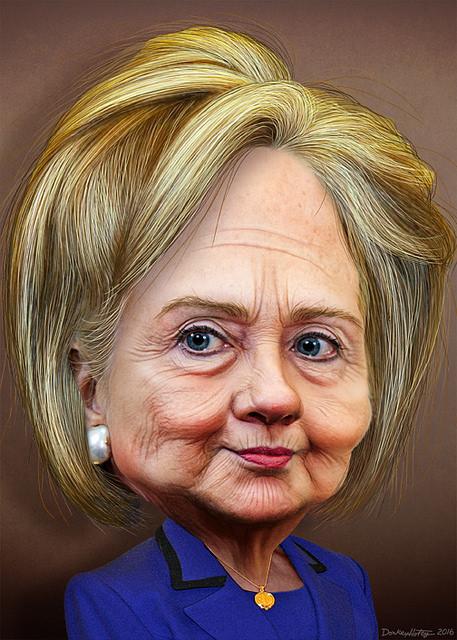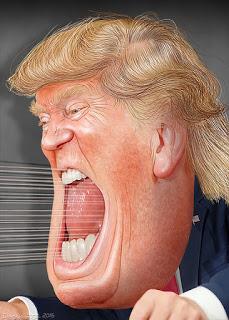

If there is a Hell, it must be freezing over right now. That's because the largest newspaper in Texas, the Dallas Morning News, has endorsed Hillary Clinton for president.
This is monumental. The DMN has been a bastion of conservatism, and has not endorsed a Democrat for president in the last three-quarters of a century.
Here's what the editorial board had to say about Hillary Clinton:
There is only one serious candidate on the presidential ballot in November. We recommend Hillary Clinton.
We don't come to this decision easily. This newspaper has not recommended a Democrat for the nation's highest office since before World War II — if you're counting, that's more than 75 years and nearly 20 elections. The party's over-reliance on government and regulation to remedy the country's ills is at odds with our belief in private-sector ingenuity and innovation. Our values are more about individual liberty, free markets and a strong national defense.
We've been critical of Clinton's handling of certain issues in the past. But unlike Donald Trump, Hillary Clinton has experience in actual governance, a record of service and a willingness to delve into real policy.
Resume vs. resume, judgment vs. judgment, this election is no contest.
We've been critical of Clinton's handling of certain issues in the past. But unlike Donald Trump, Hillary Clinton has experience in actual governance, a record of service and a willingness to delve into real policy.Resume vs. resume, judgment vs. judgment, this election is no contest.
In Clinton's eight years in the U.S. Senate, she displayed reach and influence in foreign affairs. Though conservatives like to paint her as nakedly partisan, on Capitol Hill she gained respect from Republicans for working across the aisle: Two-thirds of her bills had GOP co-sponsors and included common ground with some of Congress' most conservative lawmakers.
As President Barack Obama's first secretary of state, she helped make tough calls on the Middle East and the complex struggle against radical Islamic terrorism. It's no accident that hundreds of Republican foreign policy hands back Clinton. She also has the support of dozens of top advisers from previous Republican administrations, including Henry Paulson, John Negroponte, Richard Armitage and Brent Scowcroft. Also on this list is Jim Glassman, the founding executive director of the George W. Bush Institute in Dallas.
Clinton has remained dogged by questions about her honesty, her willingness to shade the truth. Her use of a private email server while secretary of state is a clear example of poor judgment. She should take additional steps to divorce allegations of influence peddling from the Clinton Foundation. And she must be more forthright with the public by holding news conferences, as opposed to relying on a shield of carefully scripted appearances and speeches.
Those are real shortcomings. But they pale in comparison to the litany of evils some opponents accuse her of. Treason? Murder? Her being cleared of crimes by investigation after investigation has no effect on these political hyenas; they refuse to see anything but conspiracies and cover-ups.
We reject the politics of personal destruction. Clinton has made mistakes and displayed bad judgment, but her errors are plainly in a different universe than her opponent's.
Trump's values are hostile to conservatism. He plays on fear — exploiting base instincts of xenophobia, racism and misogyny — to bring out the worst in all of us, rather than the best. His serial shifts on fundamental issues reveal an astounding absence of preparedness. And his improvisational insults and midnight tweets exhibit a dangerous lack of judgment and impulse control.
After nearly four decades in the public spotlight, 25 of them on the national stage, Clinton is a known quantity. For all her warts, she is the candidate more likely to keep our nation safe, to protect American ideals and to work across the aisle to uphold the vital domestic institutions that rely on a competent, experienced president.
Hillary Clinton has spent years in the trenches doing the hard work needed to prepare herself to lead our nation. In this race, at this time, she deserves your vote.
And here's what they had to say about Donald Trump:
What does it mean to be a Republican?
For generations, the answer had been clear: A belief in individual liberty. Free markets. Strong national defense.
But what does it mean to be a Republican today? With Donald Trump as the party's new standard-bearer, it's impossible to say.
Even before Trump's name reached the top of the GOP presidential ticket, the party was pulled in different directions. Many Republicans held fast to the good-governing principles of the past, while a growing wing of the party yanked hard from the right to force a conscripted definition of conservatism.
Inexplicably, the presidential candidate who emerged from that ideological tug of war was the one who thumbed his nose at conservative orthodoxy altogether. Trump is — or has been — at odds with nearly every GOP ideal this newspaper holds dear.
Donald Trump is no Republican and certainly no conservative.
Individual liberty? Trump has displayed an authoritarian streak that should horrify limited-government advocates. This impulsive, unbridled New York real estate billionaire and reality-TV star wants to deport people who were born in the U.S. and don't meet his standard for loyalty. He has proposed banning all Muslims from entering the country, even those escaping Islamist rule, and won't rule out creating a database of Muslims already living here.
His open admiration of Russia's Vladimir Putin is alarming.
Free markets? Economic conservatism? Ronald Reagan once said that "protectionism is destructionism." Trump, on the other hand, has called the Trans-Pacific Partnership "a rape of our country."
Businesses who invest overseas, he says, should pay a hefty fine on imports. (We'll leave aside for a moment his hypocrisy in pretending that investing in hotels abroad, as he does, is somehow different from a manufacturer investing in foreign car factories.) His protectionism would likely force the U.S. into trade wars, increase the deficit and sink the U.S. economy back into a recession.
Trump's idea of fiscal conservatism is reducing expenses by financing mountains of soul-crushing debt.
Strong national defense? Trump pledges to make our military "so big, so powerful, so strong that nobody — absolutely nobody — is going to mess with us." But what does he want to do with that military? He says he supports killing the families of Muslim terrorists and allowing interrogation methods "a hell of a lot worse than waterboarding." And if the military balks at obeying such orders? "If I say do it, they're gonna do it," he says.
His isolationist prescriptions put sound bites over sound policy: Invite the Russians into our elections. Bomb the Middle East into dust. Withdraw from NATO.
It's not easy to offer a shorthand list of such tenets, since Trump flips from one side to the other, issue after issue, sometimes within a single news cycle. Regardless, his ideas are so far from Republicanism that they have spawned a new description: Trumpism.
We have no interest in a Republican nominee for whom all principles are negotiable, nor in a Republican Party that is willing to trade away principle for pursuit of electoral victory.
Trump doesn't reflect Republican ideals of the past; we are certain he shouldn't reflect the GOP of the future.
Donald Trump is not qualified to serve as president and does not deserve your vote.
(The caricatures of Clinton and Trump above are by DonkeyHotey.)

